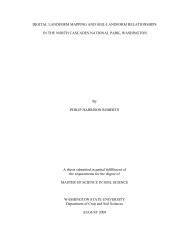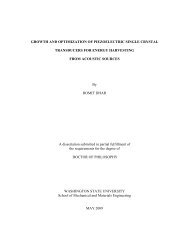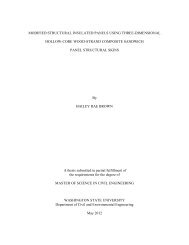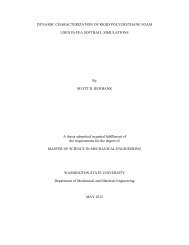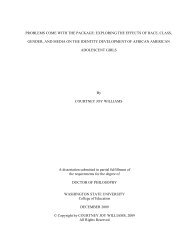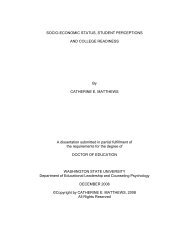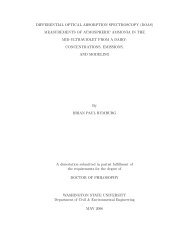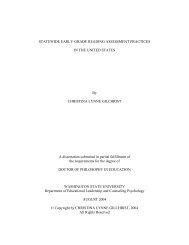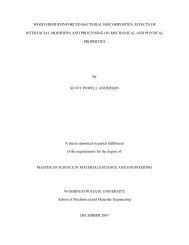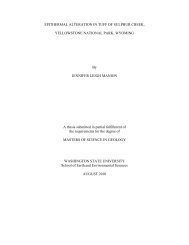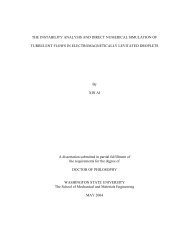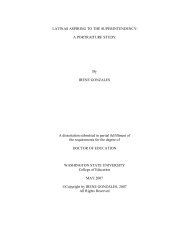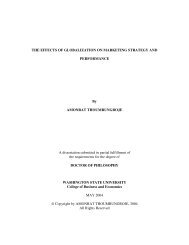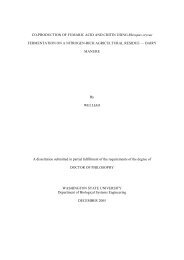the moral reasoning of student athletes and athletic training students
the moral reasoning of student athletes and athletic training students
the moral reasoning of student athletes and athletic training students
Create successful ePaper yourself
Turn your PDF publications into a flip-book with our unique Google optimized e-Paper software.
institutions, conferences, <strong>and</strong> national <strong>of</strong>fices staff – shares a belief in <strong>and</strong> commitment to: <strong>the</strong><br />
highest levels <strong>of</strong> integrity <strong>and</strong> sportsmanship” (NCAA, 2007, Our Mission). And, while higher<br />
education researchers continually debate <strong>the</strong> mission <strong>and</strong> purpose <strong>of</strong> higher education, threads<br />
about honor <strong>and</strong> integrity are present within most college <strong>and</strong> university missions <strong>and</strong> goals<br />
(Cohen, 1998). Because <strong>of</strong> <strong>the</strong> expressed purpose <strong>of</strong> developing individuals’ <strong>moral</strong> character<br />
prominent in colleges <strong>and</strong> universities <strong>and</strong> <strong>the</strong> NCAA mission <strong>and</strong> <strong>the</strong> continual <strong>moral</strong> issues <strong>and</strong><br />
problems that surface in intercollegiate sport today, it is <strong>of</strong> interest to examine to what extent<br />
colleges/universities <strong>and</strong> <strong>the</strong>ir <strong>athletic</strong> departments develop character.<br />
Lickona (1991) states that <strong>moral</strong> character is comprised <strong>of</strong> <strong>moral</strong> knowing, <strong>moral</strong> feeling,<br />
<strong>and</strong> <strong>moral</strong> action. He states that <strong>the</strong>se are not distinctly different categories, but ra<strong>the</strong>r <strong>the</strong>y work<br />
toge<strong>the</strong>r to help individuals learn to identify <strong>moral</strong> issues, perspective take, know <strong>moral</strong> values,<br />
gain <strong>moral</strong> <strong>reasoning</strong> skills, <strong>and</strong> gain self knowledge (all components <strong>of</strong> <strong>moral</strong> knowing),<br />
underst<strong>and</strong> empathy <strong>and</strong> gain self esteem, self control, humility, <strong>and</strong> learn to love <strong>the</strong> good<br />
(<strong>moral</strong> feeling), <strong>and</strong> <strong>the</strong>refore gain <strong>the</strong> will, competence, <strong>and</strong> habits or positive <strong>moral</strong> action.<br />
Measuring character in its entirety as explained by Lickona would be difficult if not impossible,<br />
<strong>the</strong>refore many researchers have examined different aspects <strong>of</strong> character <strong>and</strong> <strong>the</strong>n made<br />
inferences about what this might mean relative to one’s <strong>moral</strong> character. One aspect that has<br />
received much attention is cognitive <strong>moral</strong> <strong>reasoning</strong>, an aspect within Lickona’s model under<br />
<strong>moral</strong> knowing.<br />
Cognitive Development Theory<br />
Gibbs, (1993) describes <strong>the</strong> cognitive development perspective as an attempt to,<br />
“…[I]dentify general cross-culture trends in <strong>moral</strong> development that span a lifetime culminating<br />
in an end-state <strong>of</strong> <strong>moral</strong> maturity” (Gibbs, 1993, p. 3). Of this <strong>moral</strong> maturity, <strong>moral</strong> <strong>reasoning</strong> is<br />
23



